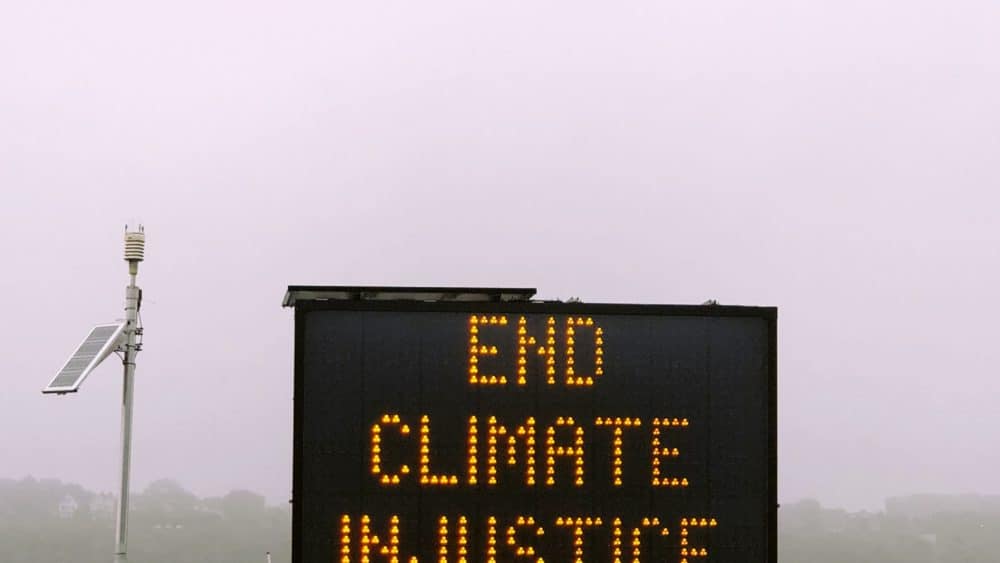[ad_1]
Air pollution is the number one environmental cause of death across the world, causing more deaths than vehicle crashes annually. But we’re learning more about how this silent killer—inextricably linked to climate change—disproportionately affects different populations. A study published by the National Academy of Sciences of the United States of America recently found that African-American communities are exposed to significantly more pollution than what is produced by more affluent and demographically Whiter communities. On average, African-American communities are exposed to a staggering 56 percent more pollution than they create. The study found Whiter and wealthier communities often consume more and have higher levels of waste that produce harmful side effects, including air particles and waste, that is often transported to landfills that border poorer and demographically Black and Hispanic communities. In the case of Black communities, that means they’re especially prone to suffering increased health risks such as strokes, heart attacks, asthma and even premature death.
This study builds on a mounting body of research that shows
how climate change is harming communities of color at a far higher rate and
with even more devastating consequences. Statistically, communities of color
are more likely to live near hazardous sites like landfills and industrial
plants. They’re also more likely to live in communities with poor air and water
quality ratings. Even more troubling is that Black Americans are three times
more likely than White Americans to die from exposure to air pollution and
nearly three times more likely to die from asthma compared to any other racial
or ethnic group. African-Americans also tend to live in areas that are more
vulnerable to natural disasters, leading to displacement and death. This trend
is especially troubling given that non-White communities are less likely to
have robust official efforts to rebuild their communities in the aftermath of
natural disasters— a pattern made painfully clear to the nation following Hurricane
Katrina, and that is pervasive throughout the country. On average, Black
homeowners receive $8,000 less in government aid than White homeowners because
of differences in housing values. While all communities are feeling the effects
of climate change, areas with larger immigrant and lower-income populations
often face added burdens—such as the lack of access to health care resources
and aid resources. As we work to confront climate change, it’s important that
we understand that the most dire impacts of climate change aren’t hitting all
Americans equally.
Just last month in Las Vegas, I attended a roundtable with
Chispa Nevada, the Sierra Club, NextGen Nevada, the Asian Community Development
Council, Nevada Conservation League and others to discuss how climate change
uniquely impacts communities of color. Las Vegas is getting hotter at a faster
rate than any other city in the nation, according to the research group Climate
Central, and it has an F rating from the American Lung Association for particle
pollution and high ozone days. I heard from many people of color about how
their communities and families are being impacted. I was struck by Las Vegas
advocates such as Dr. Mary House, who talked about how studies don’t reflect
how climate change is impacting Black and Brown communities because they’re
primarily conducted on White people. I also heard from mothers whose young
children face health issues from severe asthma to cardiac arrest. The time for
action on climate change is now, but we also need to act on meaningful
legislation to ensure protections for communities of color.
That’s why I’ve recently co-sponsored the Climate Change
Health Protection and Promotion Act. This legislation would support state and
local health departments in conducting research to develop preparedness plans
so that our communities are better prepared to handle the health impacts of
climate change. I’m always looking for new ways to partner with local leaders
and to promote our clean energy economy – attracting new businesses and
investing in green technology – while also protecting our natural resources.
For these reasons, I co-sponsored the Clean Energy for America Act to help
further Nevada’s green energy production. This legislation would reduce carbon
pollution over the next decade through a series of incentives for clean energy
and the promotion of new technologies. I will continue to support state-level
proposals as well, such as the recent ballot question to increase Nevada’s
renewable energy portfolio standard to 50 percent by 2030. This vote, and the
recent passage of companion bills in the Nevada legislature, mark an important
step to significantly reduce pollution and improve the health of communities
across Nevada.
I’m doing everything in my power to listen to affected
communities, bring stakeholders together and fight for policies that protect
our planet while including the voices of our most vulnerable populations. I’m
honored to have been recently selected to serve on the Senate Democrats’
Special Committee on the Climate Crisis. This committee is the first of its
kind, and the only body in the Senate dedicated solely to investigating and
resolving the far-reaching consequences of climate change on jobs, public
health and America’s economy. I pledge to use my seat at the table to make sure
African American communities in Nevada, and throughout America, are included in
this fight.
In this debate over climate change, we must all remember
that there is no Planet B. It takes all of us working together, using our voices,
to ensure that we find solutions to the crisis confronting us on climate. As
Nevada’s senior United States senator, and the only Latina in the U.S. Senate,
I will advocate for communities of color and hold this administration
accountable.
Sen. Catherine Cortez Masto, a former two-term Nevada Attorney General, is the first woman from Nevada and the first Latina elected to the U.S. Senate.
[ad_2]
Source link

